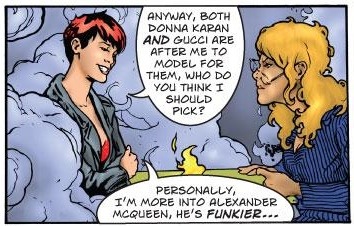On his website, Scott Bieser describes himself as “Liberty’s Cartoonist.” Certainly the graphic novels published by Big Head Press, of which Bieser is a principal, embody a strong libertarian philosophy, mixed with liberal doses of science fiction. Consider Roswell, Texas, an alternate-history tale in which Texas never joined the U.S., Charles Lindbergh is president of the Federated States of Texas, Walt Disney is president of California, and Meir Kahane is a Texas Ranger, when a flying saucer crashes in Roswell and gets the story moving.  Or La Muse, the tale of a sexy superheroine whose seemingly limitless powers are matched only by her lack of inhibitions. (Last month, La Muse received an honorable mention in the Publishers Weekly Comics Week annual critics poll.)
Or La Muse, the tale of a sexy superheroine whose seemingly limitless powers are matched only by her lack of inhibitions. (Last month, La Muse received an honorable mention in the Publishers Weekly Comics Week annual critics poll.)
In 2005, Big Head Press put the graphic novel The Probability Broach online in its entirety and saw sales of the print edition double. Since then, they have been following the free-webcomic-to-print-edition model, selling their graphic novels through a variety of channels in addition to comics stores. We caught up with Scott, who is a comics creator as well as a businessman, at NYCC and spent a few minutes talking about how the free-comics model works for him and what his plans are for the future.
Digital Strips: What’s your business model?
Scott Bieser: We put our stories in their entirety on the web, and we find that it really helps to promote the sales of the book, rather than doing a partial sample or a subscription. It’s kind of the Cory Doctorow model.
DS: Do you sell ads on the site?
SB: We sell a little advertising. It’s mostly beer money, but it’s growing a little bit at a time.
DS: How long have you been putting full stories on the website?
SB: Since 2005.
DS: How are you selling your print editions?
SB: We are selling our books through Diamond and Baker and Taylor. Pretty much our two biggest channels are Diamond and Amazon, to Baker and Taylor, the library market, independent bookstores. I haven’t seen us in Barnes and Noble yet, other than on their website.
DS: How has putting the books online affected sales?
SB: We know putting it on the web made a jump in sales. The initial [edition of] Probability Broach, we sold X number of copies in the first three months after release, when we only had the first 42 pages on the web. That was in 2004. A year later, in 2005, we put the full story on the web format. We re-serialized it and put up 10 pages a week. When we did that, we sold 2X copies, approximately. So we know that it’s a great way to promote sales.
We find that the demographics of the comic book direct market is a little different from the webcomics market. There is some overlap. Even though there is a lot of illegal downloading of direct market comics on the web, the people who normally read webcomics day to day are a different group: They tend to be younger, and they tend not to be the kind of people who go into comics shops, but they do order from Amazon. So when we do shows like this, it’s hit or miss.
DS: Are you satisfied with your sales?
SB: Not yet, but it’s getting better. We’re in perseverance mode. We know we’re on the right track. We’re a small company, we don’t have a lot of connections or marketing budget, but every year things are getting better. We have the capital to persevere for the next few years.
DS: How did you manage that?
SB: My brother cashed out of the dotcom business right before the last crash. He handles the finances and I handle creative, and we put our heads together on marketing.
DS: Who reads your comics?
SB: Two of our books [Time Peeper and Roswell, Texas] by L. Neil Smith, have a definite demographic that’s libertarian and skews closer to 40 and 50. But La Muse is more within the mainstream of comics, more the 30s, a lot more women than average.
DS: What’s next?
SB: Odysseus the Rebel and Escape from Terra, a continuing series that has long story arcs. We will publish collections of that later.
Odysseus the Rebel a is a rethink of the Odyssey story, set in ancient Greece with familiar characters. It has a few different themes, but it’s really more focused on Odysseus and his enmity with Poseidon. It has kind of a twist ending—at the end he does come back and reclaim his wife, but then something strange happens.
When I went to do Odysseus I focused on webcomics culture, a younger audience. I focused on a simpler, cleaner line style, influenced by manga and anime but also ancient Greek vase art.
Escape from Terra is sort of classic 50s sci fi, humans colonizing the solar system. There’s a fairly strong political element to these stories, independent cowboy types in the asteroid belt, they like being free, they don’t like paying taxes. There’s a fairly strong government, kind of like the UN on steroids, and they decided those guys out in the belt are making too much money and they need to deal with problems on earth. That’s the main conflict source of the story, although there is really more to it—there’s strange things going on in the belt and on Mars, interesting characters running around doing some pretty amazing things.
